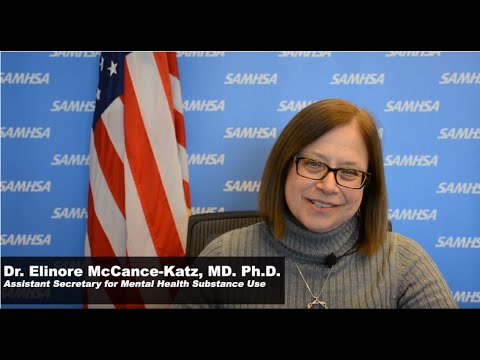
(7-8-19) With only sixteen months to go before the presidential election and a possible change in leadership, Assistant Secretary for Mental Health and Substance Abuse Dr. Elinore McCance-Katz continues to push for substantive changes at the Substance Abuse and Mental Health Services Administration. (SAMHSA).
The latest – urging states to study their civil commitment laws and promoting greater use of psychiatric advance directives (PADS). 
In a public meeting last week, Dr. McCance-Katz distributed Civil Commitment and the Mental Health Care Continuum: Historical Trends and Principles for Law and Practice – a comprehensive SAMHSA study of civil commitment in America. The paper was distributed to members of the Interdepartmental Serious Mental Illness Coordinating Committee (ISMICC), which was created to advise Congress on ways to improve federal mental health/substance abuse services. I am the parent ISMICC representative.
The federal government doesn’t have authority to change civil commitment laws. That’s up to each state legislature. But in the last decade, nearly every state has sought a way to broaden criteria beyond dangerous to self or others.
And for good reason.
Relying strictly on dangerousness is foolish.
Originally meant to protect individuals from being wrongly hospitalized, it has become an excuse by hospitals and mental health providers to deny treatment. Waiting for someone to harm themselves or others has lead to individuals, such as my son, being arrested for crimes committed while they were clearly psychotic. It has resulted in the most seriously mentally ill being abandoned on our streets.
Dr. McCance-Katz is urging states to re-examine commitment criteria while encouraging legislators to take steps to limit the need for involuntary hospitalizations by financing robust community services and greater use of Assisted Outpatient Treatment.
In addition to the SAMHSA report on civil commitment, Dr. McCance-Katz released an expert panel study that suggested it would be helpful if the federal government drafted a model civil commitment law to bring continuity to states. That panel was composed of consumer advocates, law enforcement, judges and mental health care providers.
While SAMHSA can’t dictate state policy, SAMHSA’s two reports are intended to foster state level discussions.
Dr. McCance-Katz promotes greater use of PADs.
A PAD is a legal document written by a currently competent person who lives with a mental illness outlining what sort of treatment they desire if they are unable to make decisions. In addition to describing treatment preferences, PADs identify a person to make treatment decisions, should the person with a mental health condition lack that capacity.
Dr. McCance-Katz questioned why patients are not being encouraged to fill out PADs when they are discharged from hospitals, treatment facilities, and or jails/prisons.
Wider use of PADs is a great idea.
Continued Lack of Hospital Beds
Dr. McCance-Katz expressed surprise during the ISMICC meeting that more state mental health directors have not sought IMD waivers.
The Medicaid Institutions for Mental Diseases (IMD) exclusion prohibits federal Medicaid dollars from being spent to care for most patients in mental health and substance use disorder residential treatment facilities larger than 16 beds.
One reason the IMD exclusion was passed was to prevent states from warehousing patients in large hospital/nursing home facilities.
Because of the opioid epidemic, the Trump Administration agreed to waive the IMD prohibition for states seeking to open drug treatment facilities larger than 16 beds.
Dr. McCance-Katz and ISMICC’s non-federal members pushed for IMD waivers for mental health treatment facilities to be granted too because of a national shortage of inpatient beds.
The average wait time for a non-life-threatening emergency in a hospital ER is three to four hours. For a psychiatric emergency that is non-life-threatening it is three to four days. Lifting the IMD would provide more access to inpatient beds.
But while states have been quick to apply for IMD waivers for drug treatment, few have pursued them for mental health, the assistant secretary reported.
Some consumer groups worry that the lifting of the IMD would allow warehousing once again.
Other Tidbits From The July 2nd ISMICC Meeting
-
- Efforts are being made to allow prisoners to re-apply for Medicaid benefits 30 days before they are released. This is a much needed and important change. While someone is incarcerated, their Medicaid benefits are suspended. It takes an average of 30 days for those benefits to resume after an inmate is freed. During that 30 day gap, there’s a high probability of a relapse. Unfortunately, red tape will keep this rule change from happening anytime soon. Expect at least a year.
- The number of persons who end their own lives through suicide is now equal to the number of opioid deaths. ISMICC was told there were 47,000 suicides in 2017 compared to 47,700 opioid overdoses. Where’s the outrage about suicide compared to the attention opioids are justifiably receiving?
- More than two million Americans call a national suicide prevention lifeline – 800-273-8255 – but more would call if there was an easy to remember three digit number similar to 9-1-1. Supposedly this is in the works.
- For the first time, the federal Bureau of Prisons joined ISMICC discussions. According to its representative, prisoners with mental illnesses in its lower level institutions are being trained as peer support specialists to help their fellow inmates. Those who qualify can be employed once released to help prisoners re-enter their communities. That’s great news.
- Complaints were raised about the Justice Department using the Olmstead decision to close group homes. A stupid policy that I first warned about in a Washington Post Op Ed.
- The Department of Education once again failed to show up or participate in the July 2nd meeting. A sad commentary considering the law requires the department to participate and the importance of early childhood detection of mental illnesses. Education department officials should be shamed.
Since being appointed by the Trump administration in September 2017, Dr. McCance-Katz has made serious mental illnesses her top priority. Prior to her arrival, SAMHSA was harshly criticized by Congress for reportedly showing little interest in SMIs.



